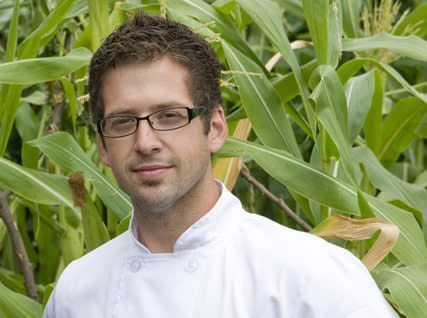Castagna’s Matt Lightner Moving to New York

Matt Lighter’s legacy: Click here for our review and photo essay on “Oregon’s culinary imagist”
It’s hard to say what has been most striking about Castagna over the past two years.
The gutsy gamble to serve boldly original, botanically inspired cooking in a neighborhood where the biggest statement is a late-night food-cart pod? The breathtaking procession of edible landscapes that, with their wild roots, forest finds, and sea hunts—served for a mere $65 a head—made farm-to-table look outdated and haggard? A half-empty dining room despite loud whispers that 30-year-old chef Matt Lightner is one of the country’s most exciting young talents and verging on stardom?
This much was always clear: Lightner is a rarity, an original thinker even by freewheeling Oregon standards, and a chef with the imagination and skills to redraw the boundaries of “local” where ever he goes. In a city where every neighborhood has a farmers market, Lightner has the drive to go out and find his tools himself, foraging his way to fresh ideas and unexpected ingredients. He’s been the odd fit in Portland, where laid-back, largely self-taught chefs create modestly priced craft cuisine in do-it-yourself settings. Lightner is a different kind of Oregon pioneer—ambitious, perfectionistic, and a skilled practitioner of science-based, avant garde cooking learned at the Michelin-starred Mugaritz in San Sebastian, Spain.
It wouldn’t—it couldn’t—last at this location, at these prices. And it didn’t.
Portland Monthly has learned that Lightner will head to New York in August to open a new restaurant on 77 Worth St in Tribeca (currently home of Compose restaurant). He’s partnering with Jodi Richard, owner of RBC Coffee Roasters in Tribeca, and other business owners and food lovers who fell hard for his food on recent visits to Portland, then lured him away. Richard, the wife of Dwight Merriman, chief technology officer and co-founder of DoubleClick, opened the first state-of-the-art animal hydro-rehabilitation center in New York City, Water 4 Dogs, and also brought Manhattan its first $18,000 Slayer espresso machine—one of fewer than twenty in the world.
It’s hard not to be happy for Lightner’s great opportunity, while acknowledging this is a serious loss for Portland. In a city bursting with original talents, from Le Pigeon’s Gabriel Rucker to Pok Pok’s Andy Ricker, Lightner still stood apart as a true innovator in high-end cuisine.
Lightner says he wasn’t looking to leave Oregon but found it impossible to pass up the opportunity to take his ideas to the next level. “They said, ‘What are your dreams? Let’s make that happen,’” he says. “I kept throwing out different scenarios of reasons why I didn’t think it would work. They kept defeating my arguments. They’re genuine and passionate and ambitious. They want to do something very interesting. It was kind of shocking. It will be a challenge, for sure. But I love a good adventure.”
The game plan is still being formulated, including a name for Lightner’s new restaurant. The opening date: this fall, tentatively. Lightner says he won’t know what he’s cooking until he gets to New York and sees the lay of the land—literally. He’s designing his own kitchen, and will influence everything down to the dishware. He expects a very small place, “calm, comfortable, and clean,” with 14 seats. Only one nightly tasting menu will be served, showcasing, no doubt, the things he loves: strange and wonderful botanicals, surprising compositions, and an unexpected taste of place.
Despite his modernist training, science will remain merely a tool in his kit, not a way of cooking. Lightner refuses to identify with any particular culinary school. “I have no set cuisine. I don’t put any labels on my food,” he says. “I just go with my own style. I’m finding my own path. I want to keep exploring a definition of American cooking, to dig deeper, to see where that leads.”
Unlike Oregon, the wilds are not just around the corner in New York. The edible ferns Lightner so often forages here aren’t growing out of those manhole covers. But he’s born to explore, and I expect he’ll be tromping through the Hudson Valley, shaking hands with fishermen in Maine, even wandering the woods in Pennsylvania. And no doubt, he’ll find a bigger audience to pay for his evolving visions.
Castagna owner Monique Siu plans to keep pushing forward with a like-minded philosophy. Chef Justin Woodward, Lightner’s second-in-command, will move into the lead role in August. “Justin has been a huge part of the creative process, and an integral part of the R&D of some of our great dishes,” says Lightner. “His approach is modernist with a great sensibility.” An alum of New York’s famed WD-50, where he worked as assistant pastry chef, Woodward has been at Lightner’s side since he arrived at Castagna in 2009. Previously, the two worked together at California’s L’Auberge Del Mar.
Will Lightner take a piece of Oregon with him to New York? “I’ve been cooking in Oregon on and off since I was 19,” says Lightner. “It’s in my blood. This is a very inspirational place. My relationship with Oregon won’t be gone. I’m at an age and point in my life where I still have the energy to do something as exciting as this. It’s a spiritual journey—it needs to happen. Maybe I’ll return one day…with a whole new set of ideas”
Lightner will cook at Castagna through July 30.
Castagna
1752 SE Hawthorne Blvd
503-231-7373
Karen Brooks is Portland Monthly‘s restaurants editor. Her next book, The Mighty Gastropolis: How Portland’s Rule-Breaking Chefs Handcrafted the New Urban Cuisine, is due out next spring from Chronicle Books.
